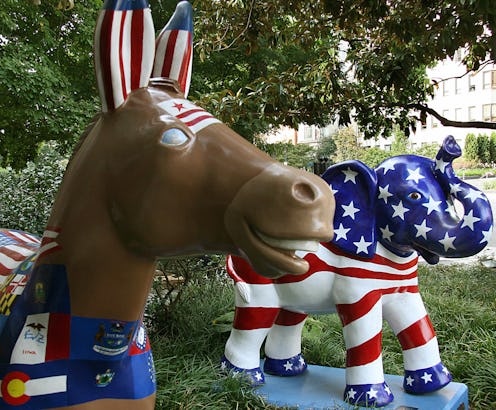News
Can You Double-Dip In The Primary Election?
As it gets closer to Super Tuesday and people line up to cast their ballot, there are still plenty of voters who have been left undecided — or perhaps just simply confused — on who to side with for the primary. Some may be wondering which party to vote for at all. So the question may come up: why not vote in both primaries? The primary process often times seems difficult enough, so perhaps it would appear better for voters to have a hand in the election regardless of the way it ultimately swings.
There's a catch, though. While primary rules frequently change on a state by state basis, one rule remains the same: voters are only able to cast a ballot for a Republican, Democratic, or Independent candidate exclusively. There's definitely no room for double-dipping when it comes to primary elections, so unfortunately voters have to pick a clear side.
Things get a little bit more complicated, however, when it comes time to determine whether a voter may cross party lines to vote for an opposing candidate. This is a factor determined by a state by state basis, and will therefore vary wildly depending on where the voter lives.
This aspect of the primary process is dictated by whether an election takes place in an opened or closed state. In a state with an open primary, voters may choose to cast their ballot for any candidate regardless of what party they have registered with. Only Alabama, Arkansas, Georgia, Hawaii, Illinois, and Indiana have traditional, open primaries. Massachusetts voters who are still unregistered on primary election day may vote openly for whichever party they choose. Likewise, Independent voters may vote for any Independent candidate that is listed on the ballot (in the case of this year's election, there are none), or choose the Democratic or Republican side.
Closed primaries are obviously, given the name, a little less forgiving. Voters may cast a ballot only within their party affiliation, and no deviation from that is allowed. In many states, the same goes doubly for Independent voters — if there are no Independent candidates to choose from, they are simply shut out of the system altogether if they decide to keep their unaffiliated status without changing prior to election day. Some states do, however, allow for Independent voters to be invited by the Democratic and Republican parties to participate in a closed primary.
So when it comes to Super Tuesday, it's best for voters of all stripes to research just how their state will allow them to vote. Whether a Democrat, Republican, or Independent, voters ought to have the opportunity to make their voice as effective as possible.
Believe it or not, both primaries and caucuses can be laugh-out-loud hilarious. Don't believe us? Have a listen to Bustle's "The Chat Room" podcast...
Image: Caroline Wurtzel/Bustle (1)
